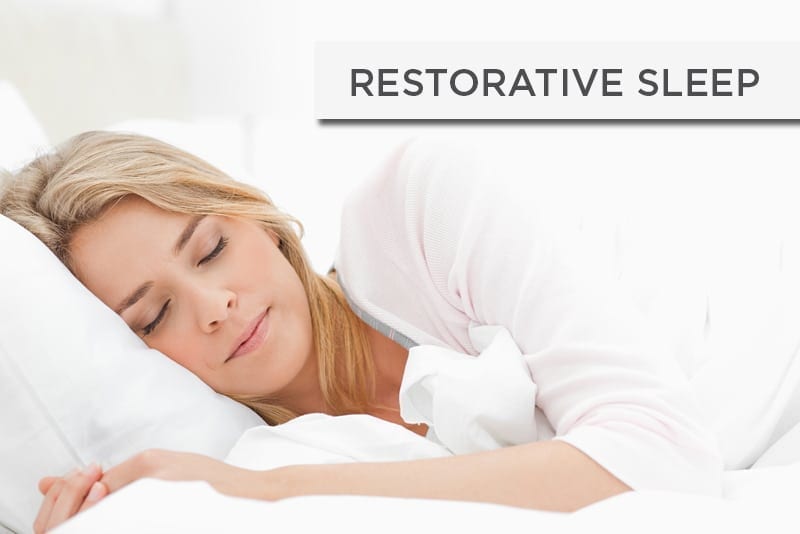Sleep isn’t just a luxury—it’s a necessity. Whether you’re a busy parent, a stressed-out professional, a student burning the midnight oil, or a senior looking to maintain vitality, restorative sleep is the foundation of a healthy, balanced life. Yet, in today’s fast-paced world, sleep is often the first thing we sacrifice. The truth is, skimping on sleep doesn’t just leave you feeling groggy; it impacts your physical health, mental clarity, and emotional well-being. Let’s dive into why restorative sleep matters for everyone and how you can achieve it, no matter your age.

What is Restorative Sleep?
Restorative sleep is the deep, uninterrupted sleep that allows your body and mind to repair, recharge, and rejuvenate. It’s during this phase that your body:
- Repairs tissues and muscles
- Strengthens the immune system
- Consolidates memories and learning
- Regulates hormones that control appetite, mood, and energy levels
Without enough restorative sleep, you’re essentially running on empty, which can lead to a host of health issues over time.
Why Restorative Sleep Matters for Every Age

1. For Children and Teens: Building the Foundation
Sleep is critical for growth and development in younger years. During deep sleep, the body releases growth hormones, which are essential for physical development. For teens, restorative sleep supports cognitive function, memory, and emotional regulation—key factors for academic performance and mental health.
Tip for Parents: Establish a consistent bedtime routine, limit screen time before bed, and create a calm, sleep-friendly environment.
2. For Adults: Balancing Work, Life, and Health
Adults often juggle multiple responsibilities, from careers to family life. Lack of sleep can lead to burnout, weakened immunity, weight gain, and even chronic conditions like hypertension or diabetes. Restorative sleep helps adults stay focused, productive, and emotionally resilient.
Tip for Adults: Prioritize sleep by setting boundaries around work hours, practicing relaxation techniques like meditation, and avoiding caffeine late in the day.
3. For Seniors: Maintaining Vitality and Wellness
As we age, sleep patterns often change, but the need for restorative sleep remains. Quality sleep helps seniors maintain cognitive function, manage chronic pain, and support overall health. Poor sleep in older adults has been linked to a higher risk of conditions like Alzheimer’s and depression.
Tip for Seniors: Stick to a regular sleep schedule, engage in light physical activity during the day, and consult a doctor if sleep issues persist.
How to Achieve Restorative Sleep (Tips for All Ages)

- Create a Sleep-Friendly Environment
- Keep your bedroom cool, dark, and quiet.
- Invest in a comfortable mattress and pillows.
- Remove distractions like TVs and smartphones.
- Stick to a Consistent Sleep Schedule
- Go to bed and wake up at the same time every day, even on weekends.
- Consistency helps regulate your body’s internal clock.
- Wind Down Before Bed
- Practice a relaxing bedtime routine, such as reading, taking a warm bath, or listening to calming music.
- Avoid stimulating activities like intense workouts or stressful conversations before bed.
- Limit Screen Time
- The blue light from phones, tablets, and computers can interfere with melatonin production.
- Try to disconnect at least an hour before bedtime.
- Watch Your Diet
- Avoid heavy meals, caffeine, and alcohol close to bedtime.
- Opt for sleep-friendly snacks like a banana, a handful of almonds, or herbal tea.
- Stay Active During the Day
- Regular physical activity promotes better sleep, but try to finish workouts at least a few hours before bed.
- Manage Stress
- Practice mindfulness, meditation, or deep breathing exercises to calm your mind.
- If worries keep you up, try journaling before bed to clear your thoughts.

The Long-Term Benefits of Restorative Sleep
When you prioritize restorative sleep, you’re investing in your long-term health and happiness. Benefits include:
- Improved mood and mental clarity
- Stronger immune system
- Better weight management
- Reduced risk of chronic diseases
- Enhanced memory and cognitive function
Final Thoughts: Sleep is a Gift to Yourself
Restorative sleep isn’t just about feeling rested—it’s about giving your body and mind the care they need to thrive. Whether you’re a child, an adult, or a senior, making sleep a priority is one of the best things you can do for your overall well-being. Start small, make gradual changes, and soon you’ll notice the transformative power of a good night’s sleep.